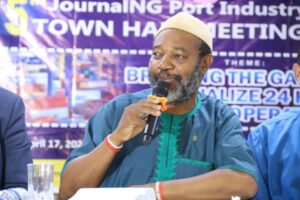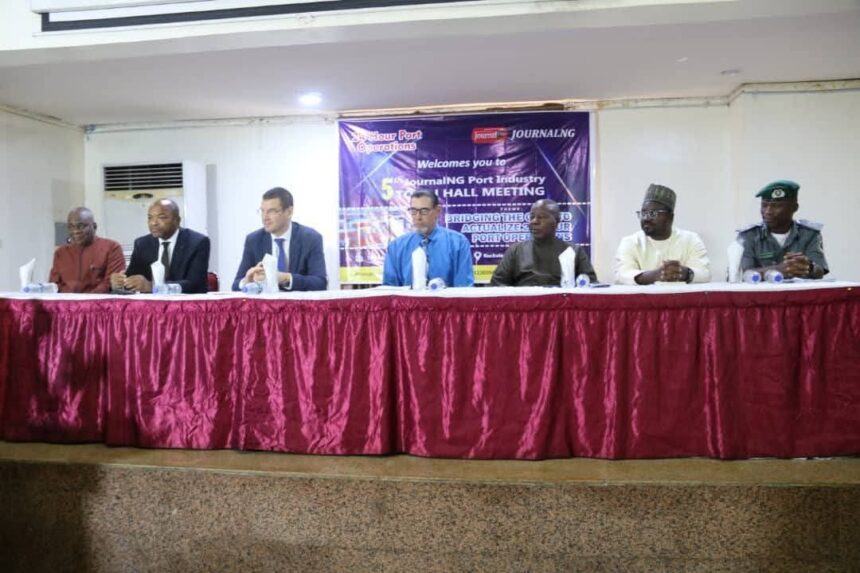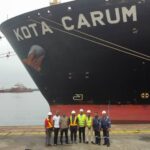By Andrew Utulu
The Chairman, Nigerian Ports Consultative Council (NPCC), Mr Bolaji Sunmola, has said that Nigeria’s seaports are strategic gateways to the nation’s economy.
Sunmola who made this assertion on Thursday in Lagos, while delivering a paper at the 5th JournalNG Port Industry Town Hall Meeting, added that the seaports facilitate over 85% of the Nation’s external trade by volume.
Sunmola however lamented that their potential remained largely underutilized due to inefficiencies rooted in infrastructural decay, bureaucratic delays, fragmented regulatory systems, and, most notably, limited operational hours.
The NPCC Chairman who spoke on the topic: ‘Bridging The Gap To Actualize 24-Hour Port Operations In Nigeria: A Strategic And Sustainable Pathway’, said a 2023 NBER working paper highlighted that increasing port efficiency from the 25th to the 75th percentile globally can reduce shipping costs by as much as 12%.
“For Nigeria, this presents a compelling case: if we are to fully leverage our maritime advantages, we must operate on a 24-hour schedule, like many global port hubs.”

Chief Eugene Nweke, Chairman of the occasion
Explaining why 24-hour port operations matter, Sunmola said modern seaports—Singapore, Rotterdam, Busan—are active 24 hours a day, 7 days a week, adding that their uninterrupted activity allows for quicker vessel turnaround, optimized cargo flows, and synchronized hinterland logistics.
Nigeria, by contrast, he said, loses productive hours at night, resulting in ship discharge delays, and increased costs that are passed down to the Nigerian consumer.
“Continuous operations, when scientifically engineered, do more than extend working hours—they redesign the flow of goods, harmonize inter-agency actions, and strengthen economic resilience.”
Giving insights and operational gaps, Sunmola gave analysis of digital and technological integration, saying that
ports like Rotterdam and Singapore leverage real-time digital platforms and Port Community Systems (PCS).
“These facilitate vessel scheduling, cargo tracking, customs clearance, and intermodal coordination. Nigeria’s National Single Window is promising in this regard and we hope that coverage and integration is seamless.
He further asserted that while global ports have successfully introduced flexible, incentivized shift systems for round-the-clock operations—supported by safety tech and real-time performance tracking—Nigerian ports still grapple with rigid shifts and minimal night-shift safety measures.
He noted that poor lighting, inadequate surveillance systems, and decaying access roads make night operations risky and inefficient.
“Safe 24-hour operations demand robust electrical grids, well-illuminated terminals, rail-link connectivity, and automated gate access.”
Ports that run 24 hours, according to him, often operate under harmonized and digitized multi-agency frameworks. He however pointed out that in Nigeria, regulatory duplication sometimes cause delays, higher transaction costs, and corruption opportunities.
“A key enabler of 24-hour port operations is uninterrupted, sustainable, and cost-effective power. Nigeria may not necessarily replicate energy-intensive, fossil-based models; instead, we can leapfrog into renewables and hybrid micro grids, tailored to our climate and capacity. Some of the available options are:
“Nigeria has excellent solar potential. Ports like Jurong (Singapore) and the Port of Los Angeles have rooftop solar systems powering key terminals. Locally, Nigerdock on Snake Island now offsets 40% of its daytime power using solar, cutting over 2,000 tonnes of CO₂ annually. This option can be adopted by more stakeholders in Nigerian Ports.

“These combine solar, wind, and biofuel generators with battery storage to guarantee consistent power. Ports like Le Havre (France) and Antwerp (Belgium) integrate offshore wind farms for sustainable grid augmentation.
“Using IoT sensors and AI-powered controllers, Ports can monitor, predict, and allocate energy consumption efficiently. This minimizes waste and ensures critical systems remain operational during power fluctuations or peak activity.
“Studies have shown that implementing solar hybrid systems in port facilities can lead to significant fuel cost savings and reduced downtime over time. For Nigeria, this translates into both financial savings and enhanced reliability,” Sunmola enthused.













